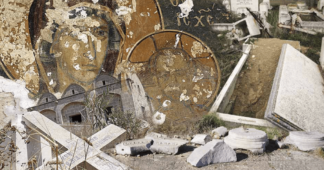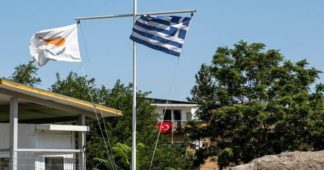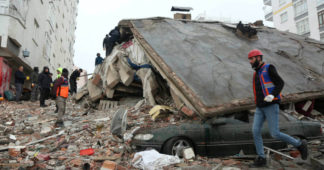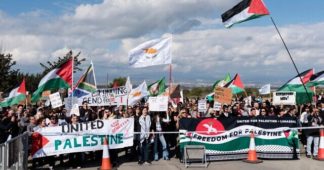The Usurpation of Properties in the Occupied Part of Cyprus
Spinelli 3G3, European Parliament
by Aziz Şah
Dec 11, 2024
I am here as a journalist from the part of Cyprus that has been under Turkish occupation since 1974. Turkey has occupied 37% of the sovereign territory of the Republic of Cyprus. To perpetuate this occupation, it has systematically committed crimes under the Geneva Convention and the Rome Statute.
The first of these crimes is the “crime of forced displacement and settler population transfer.”
The second is “the crime of unlawful and arbitrary destruction and seizure of property.”
What do the war crimes and crimes against humanity that Turkey has systematically committed in Cyprus for half a century mean for humanity?
Crimes that go unpunished are repeated!
Article 49 of the 1949 Geneva Convention states that “The Occupying Power shall not deport or transfer parts of its own civilian population into the territory it occupies.” I would like to remind you that this article was written to prevent a repeat of the colonization policies pursued by the Nazis in the territories they occupied during the Second World War.
For 50 years, Turkey has been trampling on international law in Cyprus, including the European Convention on Human Rights, the Hague Conventions, the Geneva Convention, the Rome Statute, and the Convention on the Non-Applicability of Statutory Limitations to War Crimes and Crimes Against Humanity.
The basis of Turkey’s usurpation of land in Cyprus is the construction of settlements and the transfer of population to the occupied territory, which are war crimes according to the Geneva Convention and the Rome Statute.
However, the issue does not stop with these war crimes:
There are two other pillars of land usurpation: “money laundering,” defined as a transnational organized crime, and “infiltration of legal business to launder money.” Both are directly linked to land usurpation.
Building on usurped land is part of the trafficking-drugs-money laundering cycle.
Cypriot journalists have also documented construction companies brokering human trafficking from Asia and Africa. Cyprus ranks first in the European Union for first-time asylum seekers per capita. The Purnara Refugee Camp in the Republic of Cyprus is overcrowded with migrants who were brought to the occupied territory under the guise of being “workers.”
Black money in the occupied part of Cyprus enters the world and EU market through shell companies.
In 2024, five individuals were prosecuted in the courts of the Republic of Cyprus for land usurpation and money laundering crimes, following complaints by Cypriot refugees who were expelled from their homes in 1974. There are hundreds more predatory construction and real estate companies that have committed crimes.
The most prominent of these detainees is Simon Mistriel Aykut, a Turkish citizen (who also holds Israeli and Portuguese citizenship) and director of the AFIK construction company.
Apart from Aykut, an Israeli, two Hungarian, and a German real estate agent have also been indicted for usurpation and money laundering following complaints by Cypriot refugees.
Land usurpation in Cyprus does not only concern Cypriots.
The usurpation cases also affect the German and Hungarian states and the EU, because the usurped properties were sold and advertised through Hungarian and German real estate companies.
Was the money from these illegal transactions in the occupied part of Cyprus transferred to Germany and Hungary? If so, how?
These simple questions alone show that the issue of land usurpation in the occupied part of Cyprus is an EU issue as well.
The case of Simon Mistriel Aykut, the director of the AFIK company, who committed war crimes and usurped individual property rights by building settlements on the land of refugees expelled at gunpoint in 1974, is even more complex. AFIK, the company that committed the crime of land usurpation in Cyprus, also operates in Germany, Greece, Turkey, and Israel. According to documents published by Cypriot journalists, the Aykut family also owns companies in the Cayman Islands, the Netherlands, and the Republic of Cyprus.
Land usurpation in Cyprus is a serious transnational crime for the EU. The settlements built on the usurped land are funded with black money of unknown origin. These properties are marketed worldwide, including in Europe, by Russian, Iranian, Israeli, German, British, Hungarian, and Eastern European real estate agents and companies.
This is similar to the illegal settlements in the West Bank, and potentially Gaza in the future, that are being marketed by European companies.
The settlement policies of Turkey and Israel in the occupied territories are similar. This is also evident in United Nations resolutions:
For Cyprus, Resolutions 33/15 (1978), 34/30 (1979), 37/253 (1983), 4 (XXXII) (1976), and 1987/50 (1987) state that “changes in the demographic structure of Cyprus continue with the influx of large numbers of settlers” and argue that “all unilateral actions changing the demographic structure” obstruct the return of refugees and all displaced persons to their homes.
For Israel, Resolutions 446 (1979), 452 (1979), 465 (1980), and 2234 (2015) call on it to “cease illegal settlement construction in violation of the Fourth Geneva Convention, which is an obstacle to peace.”
Criticizing Israel’s settlement policy in the occupied Palestinian territories, Turkish Foreign Minister Hakan Fidan recently said:
“You (Israel) are occupying someone’s land. You’re seizing their home, throwing them out, bringing somebody (else) in, and calling them ‘settlers.’ This is called theft.”
When Fidan criticizes Israel’s settler colonialism, he is describing the very crime of destruction of property and land usurpation that Turkey has perpetuated in occupied Cyprus for the past 50 years.
Indeed, as Hakan Fidan states, settler colonialism is theft.
In summary, it is essential to understand that, in addition to war crimes, land usurpation in Cyprus constitutes part of “transnational organized crime,” defined by the UN in 1994 to include crimes such as “terrorist acts, human trafficking, and arms and drug trafficking.”
So, what is the political motivation behind Turkey’s settlement construction carried out through real estate and construction companies?
Turkey’s policy of land usurpation aims to permanently undermine any settlement in Cyprus based on the EU Charter of Fundamental Rights and the EU acquis.
After 1974, Turkey systematically established a racist apartheid regime. First, Greek Cypriots, Maronites and Armenians were expelled from their homes. In 1975, the Turkish Ministry of Foreign Affairs issued a “directive” to move settlers to Cyprus. According to this directive, “families resettled in Cyprus must be Turkish citizens and their mother tongue must be Turkish.” Settler colonization seeks to Turkify Cyprus.
When Turkey began illegally settling people in the occupied part of Cyprus in 1975, the properties were not empty. Approximately 20,000 Greek Cypriots had remained in their homes. After 50 years of ethnic cleansing, only about 300 remain today.
In 1995, the occupation regime enacted the “Settlement, Land Distribution, and Equivalent Property (ITEM) Law,” paving the way for the sale and construction on usurped land. The construction boom accelerated after 1995.
The transformation continued with the negotiation of the Annan Plan for the settlement of the Cyprus problem between 2001 and 2004. According to the Annan Plan, the usurpers would have priority over the original owners. Although the plan was rejected, the occupation regime continues to use it as a basis for land usurpation.
A total of 694 houses were built in the occupied part of Cyprus in 1993. In 2003, with the Annan Plan, this number doubled to 1,354. In 2013, 2,882 houses were built and in 2023 this number will rise to 4,141. The construction boom continues exponentially…
Land grabbing in a country occupied by a foreign power is not a “personal matter” for refugees to solve on their own.
According to international law, occupation is a temporary situation, the occupation regime cannot have permanent effects on immovable property. Private property cannot be usurped. Permanent settlements cannot be established to change the status of land.
Many Cypriot refugees have brought individual cases before the European Court of Human Rights. The Court could not cope with the burden of these cases. As a result, the Immovable Property Commission under the occupation regime was established 19 years ago following a ruling by the European Court of Human Rights.
According to the Commission’s statement, as of November 29, 2024, a total of 7,849 applications had been submitted, of which 1,892 had been evaluated.
This means that out of approximately 170,000 refugees, only 1,892 files were evaluated in 19 years!
Moreover, the Immovable Property Commission awards a maximum of one-tenth of the property’s value as compensation. These compensations often go unpaid for years. This is because, for a Commission decision to be implemented, it must be signed and accepted by an official of the occupation regime. Files remain pending for years without a signature, further exacerbating the victimization of refugees.
The Immovable Property Commission has become part of the problem, not the solution. Because the occupation regime and the European Court of Human Rights do not have the same goal in the property issue.
Beyond solving the problem, the Immovable Property Commission has caused an avalanche of land looting. The establishment of the Commission was a guarantee for the usurpers. Realizing that they would be able to get away with the property they usurped without paying any price, the companies accelerated their land looting.
Today, the Immovable Property Commission is being used as a weapon against refugees. Because Cypriot refugees were prevented from even filing a compensation case at the European Court of Human Rights, the usurpers were relieved. This is also a violation of human rights: According to Article 34 of the European Convention on Human Rights, the effective exercise of the right to apply to the European Court of Human Rights cannot be prevented in any way.
The right of return of refugees and their descendants is a right recognized by the Universal Declaration of Human Rights and the Fourth Geneva Convention.
The transfer of Cypriot refugees’ property cases by the European Court of Human Rights to the Immovable Property Commission in the occupation regime has emboldened land usurpation.
It is unacceptable that refugees are left alone on the grounds that “property is a personal matter”. Refugees lost their property in the war… Land usurpation in Cyprus is not a “personal matter”. It is an occupying power altering the status of land and the identity of a country, which constitutes a war crime and is part of transnational organized crime, including money laundering.
Georghios M. Pikis of Cyprus, a founding judge of the International Criminal Court (ICC) and the first President of its Appeals Chamber, served from 2003 to 2009 after the Court was established under the Rome Statute to prosecute war crimes and crimes against humanity. In a conference on the ICC, he stated:
“Without justice there can be no peace and without peace, human existence is left at the mercy of the ill passions of the strong for power, domination, riches and sequential inhuman acts.”
As Cypriots, we want the International Criminal Court to work for Cyprus. The human rights of Cypriots cannot be left at the mercy of the occupier. The plundered land and usurped human rights belong to all Cypriots.
“There can be no peace without justice.”
We remind our readers that publication of articles on our site does not mean that we agree with what is written. Our policy is to publish anything which we consider of interest, so as to assist our readers in forming their opinions. Sometimes we even publish articles with which we totally disagree, since we believe it is important for our readers to be informed on as wide a spectrum of views as possible.











